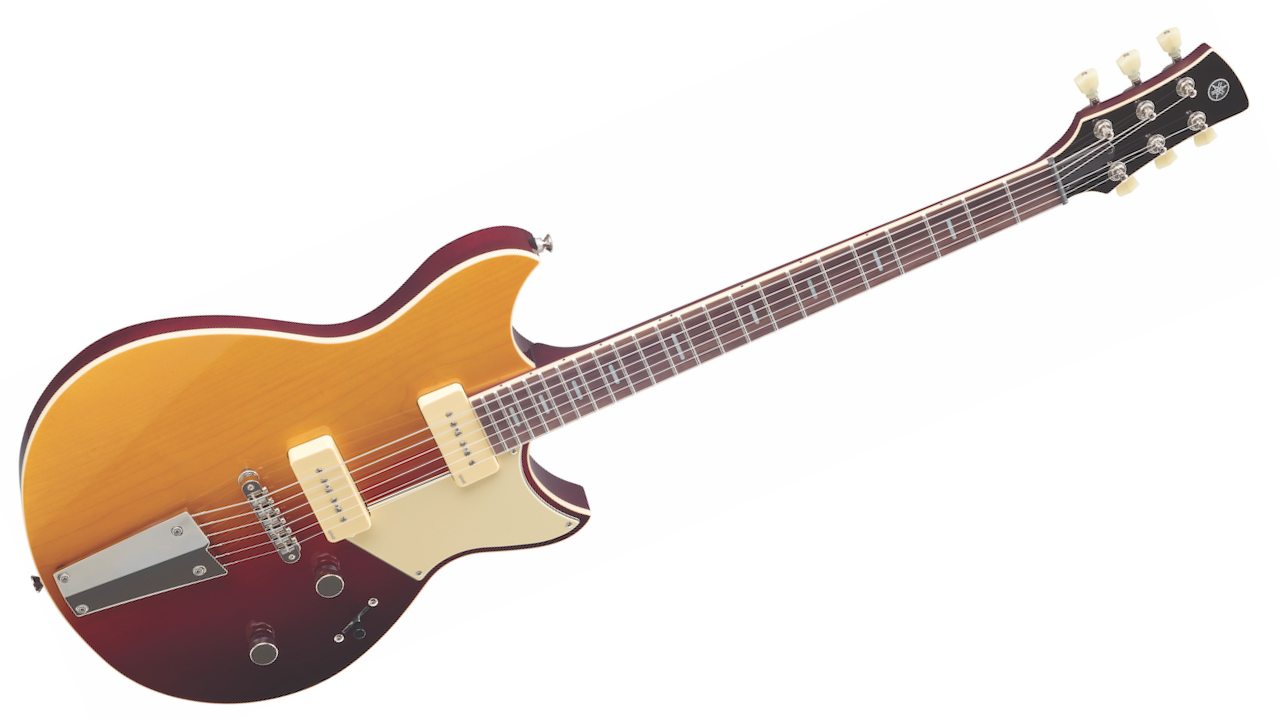GuitarPlayer Verdict
A multi-talented guitar that loves to rock, but also bends to the sweet and musical with surprising ease
Pros
- +
A cleverly styled and sonically versatile design that’s equally at home with gnarly rock and nuanced pop
Cons
- -
Some might find the Focus switch muddies and dulls the tone
You can trust Guitar Player.
In its first significant assault on the North American electric guitar market in the mid to late ’70s, Yamaha showed more-established brands how to do it right with its so-called Les Paul killer, the SG2000. In the decades since, the brand has continued to produce high-end guitars for the Japanese market, but here in the United States Yamaha has more often been known for making lower-priced models that nevertheless offer good value.
Now comes the Revstar Professional RSP02T, a guitar that shows the company returning to unbounded standards for quality and design in the U.S. market. Built at the company’s headquarters in Japan, and primed with top-notch construction and components, its a guitar whose achievements are well matched to its namesake aspirations.
Yamaha’s first Revstar hit the streets in 2015 after a years-long R&D process that put prototypes in the hands of several discerning players. The process echoed that of the SG2000’s development in the mid ’70s, which most notably spent quality time with Carlos Santana and apparently benefited from his feedback (no pun intended… or, maybe it is). The results of this venture are retained in the Revstar Professional RSP02T of 2023, but the model has been refined in several nuanced ways to deliver a thoughtful revamp of the design, if not a total re-think.
For those new to the Revstar, the overall design could be said to take cues from a handful of classics, although without nodding too heavily toward any discernible existing model. The pointy horns of the slightly offset double-cutaway body will obviously recall the Gibson SG, with a faint echo of — again — Yamaha’s own symmetrically pointy SG2000, but the offset waist and the rest of the retro-modern styling take it into different visual territory overall. Most would agree that it’s a timeless look, and a rather juicy one too, in the Swift Blue finish of our review sample.
The colorful top and dark-mahogany back are nicely complemented by off-white plastics that include a three-ply pickguard, a single-ply body top, neck and headstock binding, and pickup covers. In addition to the simple two-knob complement in half-knurled chrome, the bling quotient is increased by the elongated Racing Tailpiece, an in-house design that strides between a trapeze and a fully anchored stoptail. Otherwise, the hardware includes a Nashville-style Tune-o-matic bridge and enclosed diecast Yamaha tuners with pearloid buttons.
The passive boost comes with a subtle cocked wah–like shift in the EQ, which can work for some cool throaty stylings through a fuzz pedal
Amid all the signature visuals, one significant factor of the Revstar design involves something we don’t see. The otherwise solid body is made from two pieces of mahogany carved out with strategic chambers, with two narrow carbon-fiber reinforcement strips inlaid across the lower bout and the whole thing capped with a solid maple top. Gentle forearm and ribcage contours aid playing comfort.
The glued-in neck is a three-piece mahogany construction, with a volute to add strength behind the nut and narrow carbon-fiber strips on either side of the truss-rod channel to increase rigidity. Laid out to a 24 ¾–inch scale length, and with a width of 1.625 inches across the synthetic nut, it’s topped with a rosewood fingerboard with a 12-inch radius, 22 medium-jumbo frets and elegantly narrow MoP position markers.
All the latest guitar news, interviews, lessons, reviews, deals and more, direct to your inbox!
The semi-Gumby-esque headstock recalls that of Yamaha’s funkier pre-SG2000 designs and is adorned with an etched aluminum badge displaying the company’s triple-tuning-fork emblem — a minimalist touch on an appendage otherwise free of brand logo or model name. A Japanese “Hanko” mark on the back of the headstock — the stylized stamp that stands in for a signature or branding — signifies the Revstar Professional’s made-in-Japan quality.
Feel-wise, the neck sports a medium-C radius with a flattish back to it, which puts me in mind of Gibson’s long-running SlimTaper profile. It has never been my favorite amid the Big G neck shapes, but I find it surprisingly approachable on the Revstar, and it’s a superbly playable guitar overall — that is, easy to tuck into and get lost in without overthinking the ergonomics.
The pickups are Yamaha’s own P90 single-coils, made with Alnico magnets and coils wound to read 8.10k-ohms in the bridge position and 8.43k in the neck, in this example. In addition to the master volume and tone controls, they’re wired through a five-way switch that gives two versions of out-of-phase either side of the both-on middle position. The tone knob includes push-pull switching to engage Yamaha’s Focus switch setting, a passive boost that tapers the highs while kicking other frequencies up a notch.
Testing the Revstar Professional through a tweed Deluxe-style 1x12 combo and a 65amps London head and 2x12 cab with a selection of overdrive pedals, I found that it refused to be pigeonholed the way so many dual-P90 solidbodies can be. Make no mistake: It will crank out gnarly garage rock and gritty blues with aplomb, but it’s also more versatile than many guitars of similar specs, easily stepping up for a range of styles you might not expect it to handle.

First and foremost, the Revstar Professional rocks with gusto. Given a taste of a JHS Angry Charlie pedal into the tweed-ish 1x12, it dished out no end of bite and snarl with an aggressive midrange, while it retained a focused granularity that enhanced clarity and articulation within the dirt.
The off-kilter pairing of pickups with slightly more output in the neck seems an odd choice, and is in all likelihood a random selection from a bucket of P90s intended to be wound to approximately the same specs, but within a range of tolerances. As such, though, the hotter rhythm pickup occasionally makes it harder to tame the mud from that position.
Played clean, though, the selector’s 2 and 4 positions really come to the rescue, offering a more usable (read “less hollow and honky”) version of out-of-phase tones that favor the voicing of the pickup nearest the switch position, while making everything a little sharper, tighter and more Fenderleaning. The Revstar Professional is a very different beast from a traditional Strat, obviously, yet flip it to one of those bonus positions and few in the crowd are likely to wince when you dip into a little “Sultans of Swing” or “Scuttle Buttin’.”
With either amp pushed into breakup, or an overdrive pedal kicked in, lifting the Focus switch shifts the Revstar Professional’s voicing toward something altogether more humbucker-like, although to my ears it’s a murky, middy approximation of humbucker tone at best.
The passive boost comes with something of a subtle cocked wah–like shift in the EQ, which can work for some cool throaty stylings through a fuzz pedal. Otherwise, I found it sounded generally, well… a little worse than anything dialed up without the Focus circuit engaged. Into a clean amp, I found even less purpose in the thing, and ultimately decided it was a feature in search of a purpose, although some players might find otherwise.
All in all, though, the Revstar Professional RSP02T is an eminently playable and fiercely versatile creation that loves to rock but also bends to the sweet and musical with surprising ease. Add in its playfully appealing styling and very individual personality, and it’s a guitar that plenty are sure to dig — pros and weekend warriors alike.
Specifications
- NUT: Synthetic, 1.625” wide
- NECK: Mahogany, medium C profile
- FRETBOARD: Rosewood, 24.75” scale, 12” radius
- FRETS: 22 medium-jumbo
- TUNERS: Yamaha enclosed/diecast
- BODY: Chambered mahogany with solid maple top
- BRIDGE: Faber compensated wrap-around
- PICKUPS: Two Yamaha Alnico P90-style single-coils
- CONTROLS: Master volume and tone, with five-way switch and push-pull Focus switch on tone pot
- FACTORY STRINGS: D’Addario EXL .010–.046
- WEIGHT: 8.9 lbs
- BUILT: Japan
Dave Hunter is a writer and consulting editor for Guitar Player magazine. His prolific output as author includes Fender 75 Years, The Guitar Amp Handbook, The British Amp Invasion, Ultimate Star Guitars, Guitar Effects Pedals, The Guitar Pickup Handbook, The Fender Telecaster and several other titles. Hunter is a former editor of The Guitar Magazine (UK), and a contributor to Vintage Guitar, Premier Guitar, The Connoisseur and other publications. A contributing essayist to the United States Library of Congress National Recording Preservation Board’s Permanent Archive, he lives in Kittery, ME, with his wife and their two children and fronts the bands A Different Engine and The Stereo Field.


